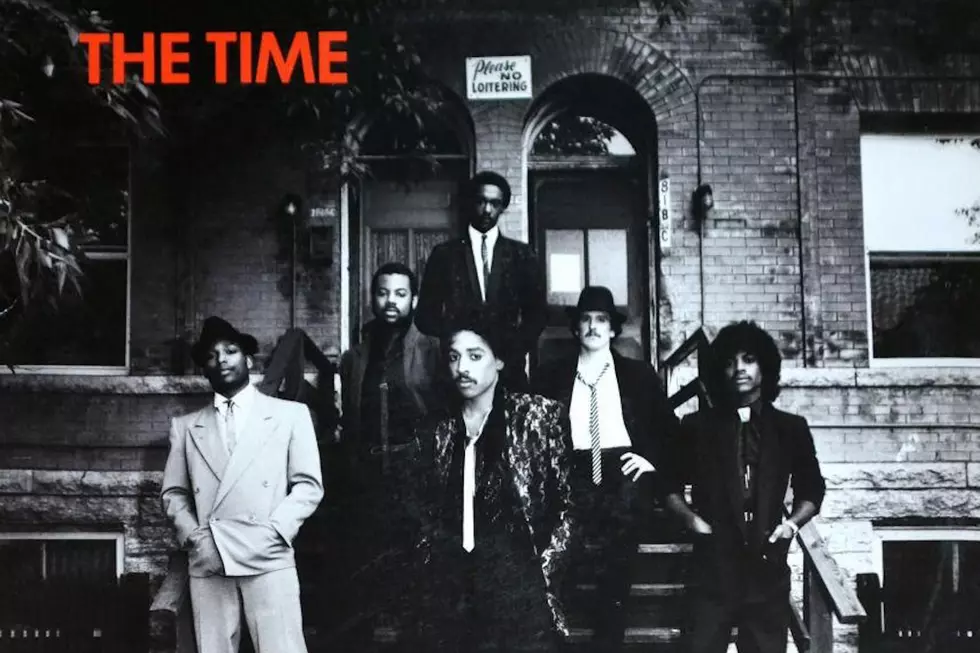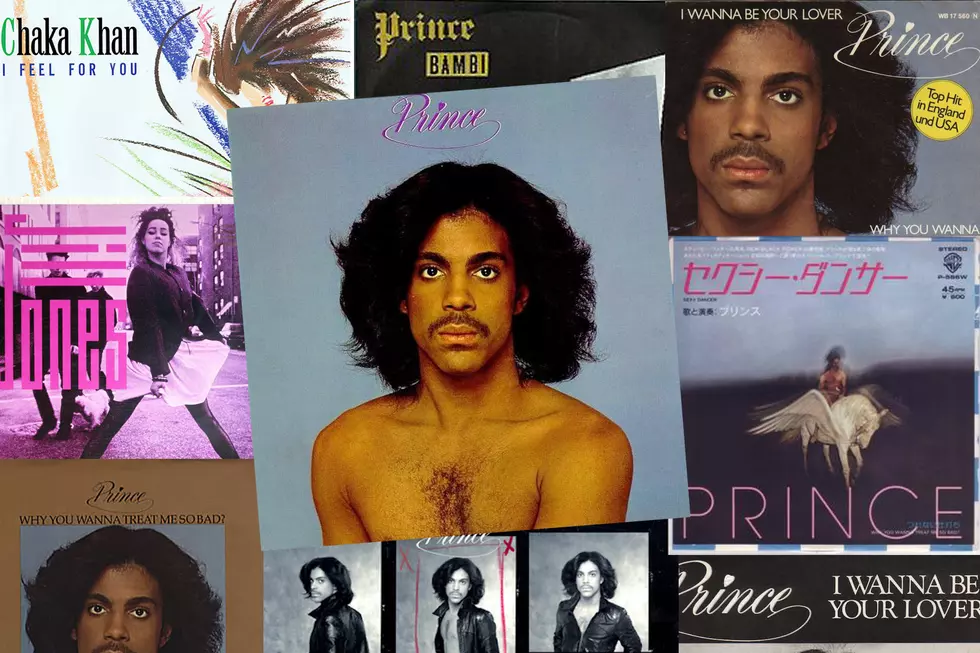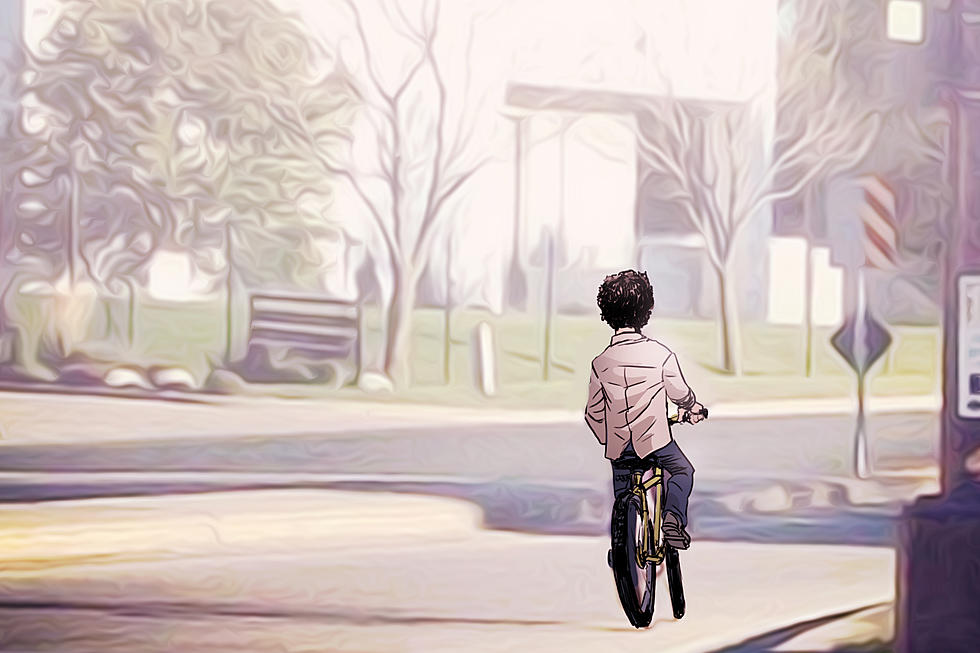
When Prince Basically Made the Time’s Debut Album By Himself
Morris Day would eventually become known as a pompadour-sporting, eyebrow-cocking, squawk-laughing scamp. But he didn't start out with anything resembling the kind of scene-stealing bravado on display in Prince's movie Purple Rain.
"I kind of always walked around with this feeling like something special was going to happen, like I had something going on," Day told the Quad-City Times in 2013. "But I wasn't sure."
His approached his early music career organically, through friendships and shared hometown connections. At first, Day was just really into the drums. Both impulses came together on the Time's self-titled debut album, which arrived on July 29, 1981.
Produced, arranged, recorded, largely written and almost completely played by Prince, The Time heralded the arrival of a group of childhood buddies – Day was credited in the liner notes with guitarist Jesse Johnson, bassist Terry Lewis, keyboardists Jimmy Jam and Monte Moir and drummer Jellybean Johnson – without actually showcasing them. Instead, the album was basically a series of period-specific Prince outtakes, with a vocal assist from Day.
Day also played drums on four tracks ("Girl," "Cool," "Oh, Baby" and "The Stick"), a testament to skills hailed by Jellybean Johnson. Listed as the Time's drummer, he nevertheless had a deep respect for Day. "Morris is a world-class drummer. A lot of people don't know that," Johnson told the Washington Post in 1992. While other kids were fooling around outside, the drummer-turned-producer said "me and him used to line our drum sets up in his house and play. And then we'd come over to my basement and line them up and play. That was fun for us."
Other than a stray background vocal from Lewis, there were apparently no other contributions from the Time. A talented amalgam was simply left to interpret these songs out on the road. Prince had the rest worked out in his head, and then in the studio, before they ever arrived.
On one level, it worked: "Get It Up" and "Cool" became Top 10 R&B hits, while the gold-selling album soared to No. 7 on the Billboard Top Soul charts. But the seeds of dissension were sewn, leading to a pitched competition between Day and Prince – and then the Time's too-early breakup.
Listen to the Time's 'Get It Up'
Perhaps it was was inevitable. After all, Day and Prince were students at rival Minneapolis high schools when they were originally introduced by mutual friend Andre Cymone.
"We hung out, and I found out [Cymone] was in a band and I went to watch them," Day told the Quad-City Times. "The band was just crazy. These guys were 13, 14 years old — Andre on bass, Prince on guitar and sometimes keyboard. The band was playing Santana, and Prince was doing these solos like he was 20 years old. It was just crazy."
Cymone eventually invited Day to join the group, called Grand Central. "That's when I got serious about music," Day told the Times. "I was casual about it, but these guys were so serious and all they talked about was 'making it.' I kind of got on that bandwagon and that's what I started talking about, thinking about and dreaming about."
At the same time, Terry Lewis and Jellybean Johnson were in another Minneapolis band called Flyte Tyme, and the two groups would occasionally face off in battles of the bands. Prince made the big time first, leaving Grand Central to sign a solo deal with Warner Bros. ahead of 1978's For You. Cymone joined Prince's touring band, and Day later filtered into the sessions for 1980's Dirty Mind. His big break was looming.
"I eventually got in the mix because Prince would let me come over and work in his [basement] studio," Day told the Washington Post. "So I was trying to get my grooves on tape, and the first thing I was really able to cut there, he wanted it." The resulting tune, titled "Partyup," was given an album-closing position on Dirty Mind, and then negotiations began: "He said, 'Do you want money for the song, or do you want me to help you get a record deal?'" And Day says he told Prince, "I'll take the deal."
Once that was secured, Prince set about disassembling Flyte Time and Grand Central to form what amounted to a touring band called the Time. Prince initially recruited Alexander O'Neal as the group's frontman, and that didn't bother a still-bashful Day. "I was not interested in being the front man at all," he told the Washington Post.
Prince and O'Neal didn't get along, however, and Day was brought forward. "When Grand Central was together," Day added, "I would come from behind the drums and sing a song or two. So, the other guys were like, 'Why don't you do it, man?'" Jerome Benton, from another Minneapolis group called Enterprise, became Day's on-stage comic foil.
Ironically, Prince's embryonic successes helped change Day's mind about singing. "I think what inspired him was that he hung out with Prince on the Dirty Mind tour," Jesse Johnson told the Post. "He got a firsthand look at what was out there, the whole music scene. That really changed his whole attitude. And that's what made the [band] get over."
Listen to the Time's 'Cool'
The Time eventually took on a more creative, hands-on role in their career, but never quite escaped from Prince's long shadow. That left Day in a confrontational, often skeptical mood. He didn't like being in the uncomfortable position of justifying their contributions. Eventually, the Time simply blew apart.
"On the first record, Prince played a lot of the instruments, but I played drums," Day told the Kansas City Star in 2009. "Every time he was in the studio, I was down there with him working just as much. We cut the tracks together. With each album, the musicians played larger roles. You can see it from all the spin-off careers. Everyone became very efficient in the studio.”
Jam and Lewis left to become producers for scores of artists, most notably Janet Jackson. Moir departed prior to Purple Rain, and the Time didn't survive long enough to see it premiere. Day and Jesse Johnson both signed solo deals, and the Time remained inactive until a brief turn-of-the-'90s reunion.
Morris jump-started the Time brand again in 1995, this time with a revolving group of contributors that featured Jellybean Johnson and Moir. But Prince remained an important background figure in the Time's story: They were forced to change their name to the Original 7ven for a 2011 album, reportedly at Prince's behest.
As such, Day still finds himself wondering about what might have been – and how much of the Time's success should be credited to Prince's unseen hand.
Reminiscing about one of their first shows, Day remembered a crush of women streaming forward, in what should have been a confirmation of their newfound fame. "Whether management paid for it or not, I don't know," he mused in the Washington Post interview. "But we were doing a show, and all of a sudden, about 20 women just hopped up and were at the bottom [of the stage] partying. And I was like, 'Yeah, that was cool.' But when I think back, you know, these 20 women just kind of came out of nowhere."
Day paused for a moment, clearly suspicious, before eventually adding: "We made it happen on our own merit after that anyway."
Prince’s Bandmates: Where Are They Now?
More From WKFR










